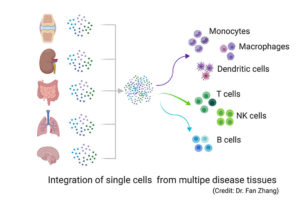Clinical and Basic Research From the Brigham Highlighted at Annual ACR Meeting
 This November, members of Brigham and Women’s Hospital’s Division of Rheumatology, Inflammation and Immunity presented several groundbreaking studies at the American College of Rheumatology’s (ACR’s) annual meeting in Atlanta.
This November, members of Brigham and Women’s Hospital’s Division of Rheumatology, Inflammation and Immunity presented several groundbreaking studies at the American College of Rheumatology’s (ACR’s) annual meeting in Atlanta.
 Traditionally, juvenile idiopathic arthritis (JIA) has been considered a distinct condition from the types of arthritis seen in adults. But increasingly, research is showing that juvenile and adult forms of arthritis represent a continuum.
Traditionally, juvenile idiopathic arthritis (JIA) has been considered a distinct condition from the types of arthritis seen in adults. But increasingly, research is showing that juvenile and adult forms of arthritis represent a continuum.



